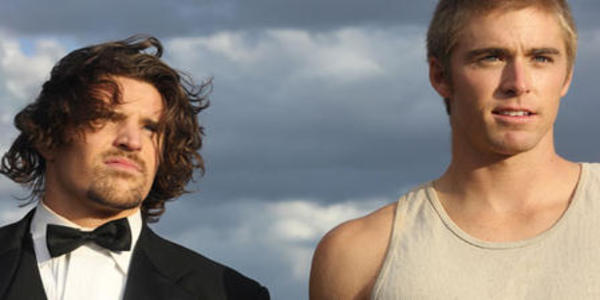Queerly Ever After #6: CAPITAL GAMES (2013)

Amanda Jane Stern is an actress, writer, and director from…
Queerly Ever After is a bi-monthly column where I take a look at LGBT+ films that gave their characters a romantic happily-ever-after. There will be spoilers.
The last few movies that I’ve covered have all been, if not good films, historically interesting ones, now it’s time to cover a bad one. There are many kinds of bad movies, some are so bad you wish they would end, but some are so bad they’re great. 2013’s Capital Games is one of those. This movie is so enjoyably bad I could watch it multiple times. Okay, I have actually watched it multiple times.
Capital Games is based on a romance novel of the same name, with a script written by the novelist herself, G.A. Hauser and directed by Ilo Orleans. Let’s be honest, plot doesn’t really matter in this film, which is good, because the plot doesn’t make that much sense. Ultimately, this film hinges on the idea that two people who seemingly can’t stand each other really just want to bone, and bone they do. In fact, there is a lot of full-frontal male nudity in this film, and given that there is a credit at the end of the film for a website called chaosmen.com (NSFW, it’s a gay porn site), I think that’s where the actors’ screen phalli were found instead of the actors themselves bearing all.
Macho City
The film revolves around former-LAPD detective Steve Miller (Eric Presnall) — and no, the movie never makes a joke about the Steve Miller Band, so all my headers are Steve Miller Band song titles — who now works at an advertising firm. The film never clearly states why Steve left the police force, but it seems to have something to do with the one time (shown in flashback) that his father, also a detective, held him and his ex-fiancee at gun point. Why his dad did this is also never clearly stated, from what I gather it’s because dad is a racist and Steve’s ex-fiancee, Sonya (Paula Ray), was African-American. Anyway, Steve now works for an advertising firm and, we’re told, he’s really good at it. He’s so good in fact that he expects to take over a big account from a man who is retiring. His new acquisition of said account is thrown into question when posh, British new guy Mark Richfield (Rory Cosgrove) arrives having been promised the account.

Just an aside, I know this is a movie but I’m fairly certain that the owner of an advertising firm would not bring in a new employee to take over a huge account when that employee has little previous experience, when there is another, older employee who has already been working on that account and built a rapport with the clients. Anything for tension I guess.
From their first meeting, Steve and Mark immediately butt heads when Mark takes Steve’s reserved parking space. For whatever reason, Mark’s presence just seems to irk Steve to no end. Steve can’t understand it, but being around Mark makes him feel aggressive. You can feel the testosterone coming off the screen.
Love Shock
The plot really picks up when it is announced that they are all going on a company retreat in the desert where they will partake in team building exercises. For some unexplained reason, Steve drives alone to the desert retreat while the rest of the office flies together. I wonder if there was some scrapped story line about Steve having a fear of flying, because this plot point makes no sense. When he arrives, he is immediately paired with Mark in a role-playing game where one person pretends to be the devil and tries to sell the other a soul. Is this a commentary about the evils of advertising? I don’t think so, I think it’s just an excuse to get Mark to try to seduce Steve, which of course, makes Steve angry. So much machismo.

Later, the employees are split up into teams of 4 to go on scavenger hunt hikes through the desert. Steve, Mark and two other guys end up getting lost. When Steve and Mark decided they’ll camp out for the night the other two men abandon them. Yes, this is going where you think it’s going. As is their usual, Steve and Mark, now alone, start fighting, Steve grabs Mark to punch him but then, he kisses him instead. One thing leads to another and whoa, split-second graphic handjob. This desert tryst will be seen again in multiple flashbacks throughout the remainder of the movie.
In the post-coital glow of the blue moon, Steve and Mark confirm with each other that neither of them is gay, and neither has hooked up with another man before. If you think the rest of the movie is going to be smooth sailing, brace yourself.
All Your Love
Upon returning home it is revealed that Mark is actually engaged to a woman named Sharon (Corinne Fox). Not only is he engaged, but he and Sharon are getting married in only a couple weeks. At the club. What club? I don’t know but it is mentioned multiple times that they are getting married at the club. Mark’s upcoming nuptials do not stop these two from carrying on their affair, with Steve continually pushing Mark to end his engagement and be with him.

There’s another plot line in here about Mark having a roommate who happens to be an out-gay man, and when Steve meets him he thinks Mark lied about never having been with a guy before, but really the roommate is just a friend. It’s confusing why Mark, who owns a huge house by the way, has a roommate and doesn’t seem to live with his fiance. Maybe she also lives in the house with the two of them? It’s never explained. I think the viewer is supposed to feel that Mark is gay and has been so closeted for most of his life, which is why he’s going through with this engagement.
Are you ready for a grand romantic gesture? Steve crashes Mark and Sharon’s wedding and finally, finally, Mark admits to Sharon that he loves Steve. And then they literally ride off into the sunset.
Capital Games: Who Do You Love?
As absurd as this whole movie is, it does one thing pretty well. Steve is depicted as a man who had been in love with a woman in the past, when he falls for Mark he willingly accepts that he is bisexual. His quick acceptance of his sexuality is a bright spot, not only in this movie, but in the ways bisexual men are usually depicted on film and TV. His now loving a man in no way negates the love he had for his former fiance, he just loves who he loves and that’s okay.
Not only does he accept his sexuality so quickly, but he is willing to come out almost just as quickly. He tells his sister at a family gathering that he is in love with another man and when she questions whether he’s going through a phase or confused he says he wasn’t confused about Sonya and he’s not confused about Mark.
Ultimately, I actually recommend watching this movie. Good it’s not, but it’s one hell of a lot of fun.
Capital Games screened at QFest on July 19, 2013. For all other release dates see here. It is currently streaming on Amazon Prime in the US.
https://youtu.be/RXHnpVdOzrcDoes content like this matter to you?
Become a Member and support film journalism. Unlock access to all of Film Inquiry`s great articles. Join a community of like-minded readers who are passionate about cinema - get access to our private members Network, give back to independent filmmakers, and more.
Amanda Jane Stern is an actress, writer, and director from New York City. She received her BA in Film, Television & Interactive Media and Theater Arts from Brandeis University. She loves regaling whomever will listen with her endless lists of fun facts and knowledge of film history. Follow her on twitter and instagram @amandajanestern













